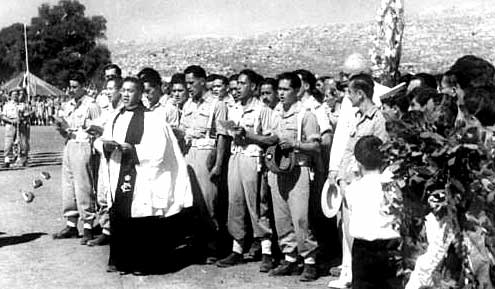|
A well-loved hymn of the Māori people. It was sung by the men of the 28th (Maori) Battalion before they went into battle, and at the battle's end. It is No. 94 in the Anglican Maori Hymn Book.
|
Au, e Ihu, tirohia Arohaina iho rā Whakaaetia ake au Ki Tou uma piri ai I te wā e ake ai Enei ngaru kino nei I te wā e keri ai Enei awha kaha mai Tiakina mai ahau I te wā e rurea nei Aratakakina e koe Roto te marino nui Aua au e waiho noa Awhitia mai rā e Koe Hīpokina iho au Raro i ou parirau Rānea tonu ana mai Tau aroha atawhai Kaha ana mai ko Koe Ki te muru i ngā hē Puna o te oranga Whakahekea tenei wai Kia pupū i roto nei Tae noa ki te mutunga Amine |
At me, O Jesus, look show compassion. Allow me to come Within your embrace at the time of distress, When these angry waves seem to assail me, When the storms get stronger. Take care of me when all around trembles, You guide me towards lasting peace Do not forsake me, would you embrace me cover me beneath your wings. There is much abundance of your love. Your strength washes away all evil. Fountain of life Let this water cascade forth and bubble from within (me) unto the end. Amen |
English translation by H T Rikihana.
The Maori Battalion was in Northern Italy at the end of the war, helping persuade Tito that the port of Trieste did not belong to Yugoslavia.
Well before the first day of peace dawned the battalion marched to the parade ground and in complete silence waited the arrival of Padre Huata. Then, as at the end of so many campaigns, the troops sang the hymn 'Au E Ihu.'
Back in the battalion lines the Maoris set about breaking down the hostility of the Slav population, and the next two months were taken up with wharf and guard duties in Trieste.
Then in early September it was announced that memorial services would be held at war cemeteries near the principal battlefields and that Crete would be visited first.
Colonel Henare was asked to detail the guard of honour, who would also act as the choir. Twenty-five men from the different tribes and of the main religious denominations were selected and went into rigorous training in ceremonial rifle drill, haka, action songs and hymn singing.
They embarked at Naples on 27 September and landed at Crete two days later. During the dedication ceremony, Padre Huata farewelled the Maori dead on behalf of the Maori people.

Led by Padre Huata ,the Maori choir sing Au E Ihu at a memorial service
on Crete, 30 September 1945, in honour of the men who died there in 1941.Similar ceremonies were later held at the Cassino and Sangro military cemeteries and the men lying in smaller plots at Coriano Ridge, Faenza, Forli, Padua, Monfalcone, and Udine were visited Padre Huata and a small party before the Maoris left Italy.
The Maori Battalion commenced its return to New Zealand on 6 December when it entrained at Florence then embarked on the Dominion Monarch at Taranto on 26 December.
The Dominion Monarch arrived in Wellington Harbour on 23 January 1946, and berthed just after midday at Pipitea Wharf, in almost the same berth as the Maori Battalion had departed from in the Aquitania nearly six years previously.
Summary from 28 Battalion history.